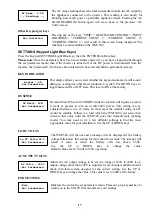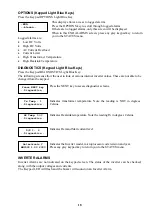
10
FAULT FINDING
1. INVERTER STAYS ON EVEN WHEN NO APPLIANCE IS BEING USED.
Some appliances such as Microwave Cookers or Video Recorders still draw current when not in use.
This is to power their displays.
This is a common problem known as a "phantom load", but it can be easily overcome with the
WM1500.
When trying to isolate a phantom load these appliances will need to be switched off at the power point.
Sequentially switch off appliances at their power points while checking to see if the inverter returns to
demand start mode after a 10 second delay. See “Handy Hint” on page 7 if your inverter is located
remotely. Once you have found the offending appliance, adjust the sensitivity of the demand start up
(see page 6) until the Inverter turns off. Once this is done re check that small loads will still bring the
Inverter on when required.
2. INVERTER WILL NOT COME ON WHEN SMALL APPLIANCE IS SWITCHED ON.
This means that your demand start sensitivity is set too high. With the appliance in question switched
on, adjust the demand start sensitivity (see page 6) until the WM1500 turns on.
3. INVERTER SHUTS DOWN DURING MIDDLE OF THE DAY AND COMES BACK ON
LATE AFTERNOON.
This is more than likely caused by high battery volts during peak charging times from solar panels.
Battery volts should never exceed 34 volts. If this is the case, have your Solar Regulator checked.
This could be potentially dangerous so we advise you to consult your system designer immediately.
4. INVERTER SHUTS DOWN WITH LOW VOLTS.
If your WM1500 has shut down because of low DC volts it could be due to the following:
(1)
A sustained large load could be causing the battery volts to drop below the cut out voltage.
(a)
The Battery Bank is too small for the loads you wish to use - consult your system designer.
(b)
A bad connection between the batteries and inverter due to a loose or corroded terminal. In
this case, please refer to the maintenance section of this manual.
(c)
One or more battery cells could be faulty - consult your battery supplier.
(2)
If your battery volts are below 24.0V with no loads connected, the batteries may require charging.
Use a hydrometer to check the specific gravity of each cell. Consult your battery manual for the
correct specific gravity (SG) readings.
5. INVERTER SHUTS DOWN DUE TO HS TOO HOT
This is likely under sustained heavy load conditions since the WM1500 shuts down to protect its
internal components. If you believe that the load is not excessive, check around the Inverter case and
heatsink for obstructions to airflow as this will cause the Inverter to heat up much quicker and shut
down sooner than normal. Also check that the clearances around the WM1500 are as specified in the
INSTALLATION section of this manual.
6. INVERTER PULSES SLOWER THAN NORMAL WHEN IN STANDBY
This means that the inverter has not been switched on for approximately 20 minutes and has gone into a
power saving mode, thus pulsing at about half the normal rate.





































